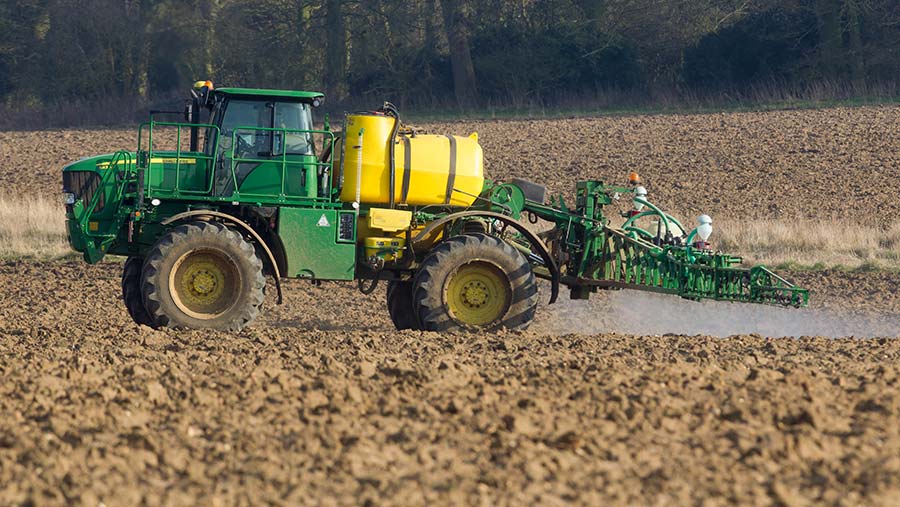Farmers join forces to fight ‘false knowledge’ on glyphosate
 © Tim Scrivener
© Tim Scrivener Hundreds of farmers across Britain are coming together in a concerted effort to show politicians and the public why glyphosate is so critical to agriculture and the environment.
Glyphosate is the world’s most widely used herbicide and has long been the focus of an aggressive campaign from pressure groups, which want the broad-spectrum herbicide banned, mainly over fears it causes cancer.
In response, a petition against a glyphosate ban was launched this week by Lincolnshire-based agronomist Sean Sparling, and received more than 1,580 signatures within the first 24 hours.
See also: Farmers ‘must add voices’ to glyphosate debate
Stating his case for continued use of the weed-killer, Mr Sparling of SAS Agronomy argued “whole areas of the east of England will become overrun by weeds” if glyphosate was unavailable to farmers.

Sean Sparling
He criticised those campaigning for a ban and urged farmers to push back against “false knowledge and pseudoscience”.
“Glyphosate is keeping Britain farming – it’s as simple as that. And despite what those misinformed activists who are demonising it are saying, 80% or more of the glyphosate that’s applied in the UK never actually touches or comes into contact with the growing crop.”
Environmental benefits
Farmers are also posting detailed and emotive letters online and on social media, spelling out to the public what it would mean to lose glyphosate.
Essex grower George Young has written a blog post explaining what he uses the chemical for and why he feels it is needed to help farm ecosystems and wildlife flourish.
“I practice a type of farming known as zero tillage. The results of this have been tremendous for the natural habitat on the farm,” he wrote.
“Some people are trying to ban this chemical due to potential carcinogenic risks. However, it has been scientifically proven that this risk is lower than that of coffee or bacon.
“The ability to use this one chemical enables me to use significantly less pesticides, and consequently be a much better guardian of the land.”
See also: Opinion: Glyphosate critics don’t used diesel, presumably?
Nuffield scholar and Gloucestershire farmer Jake Freestone has also penned a blog post rejecting the argument that ploughing can be used to control weeds as a more environmentally friendly alternative if glyphosate was outlawed.
“From the environment’s point of view, cultivations are not a good idea,” he wrote. “The most significant reason is that we are adding air to the soil, which reacts with the carbon locked in the soil, releasing carbon dioxide into the atmosphere – a significant ingredient in global warming.
“The tractors we use release nitrous oxide as they burn the diesel (just like diesel cars) and ploughing uses a lot of diesel.”
Last June the European Commission renewed the licence for glyphosate for 18 months to allow more time for the European Agency for Chemical Products to reassess the safety of the product.
The study is due out this summer with an all-important vote on the longer-term approval of glyphosate scheduled for the end of 2017.
The NFU is urging farmers everywhere to write to their MPs and MEPs on the issue, and to invite them on to their farms to explain how glyphosate helps them operate in a more environmentally sensitive way.
#glyphosateisvital
On Twitter, the hashtag #glyphosateisvital has been trending as farmers seek to broadcast their messages to the general public and take on misinformation, while others are writing letters to their local politicians.
Just because we use #glyphosate and other pesticides on the farm doesn't mean to say we can't have plentiful wildlife pic.twitter.com/6P26fJU7M1
— Andy Roberts (@handles4forks) February 26, 2017
Worm count this afternoon on some #zerotill wheat reinforced enviromental benefits of #zerotill. #glyphosateisvital pic.twitter.com/CRmoM1kiXH
— Edward Ford (@Ed_Farmer_Ford) February 26, 2017
Write to your MP, let's get this issue up the agenda, no winners if glyphosate goes. My MP has even replied! #glyphosateisvital https://t.co/wejsEKuBEn
— Nick Hood (@Steakrareplease) February 24, 2017
Letter sent to local MP/MEP re. Glyphosate. Really gets you thinking how negative an impact a ban would have #glyphosateisvital
— Joe Fisher (@JJ_Fishy) February 24, 2017
Using #glyphosate today will hugely reduce need to use herbicides on S barley to be planted here. #glyphosateisvital pic.twitter.com/eO8W6A0mzb
— James Richard Cox (@JamesRCox69) February 17, 2017
This is my piece to local village free mag, it takes 10 minutes. Please support #glyphosateisvital pic.twitter.com/D3MomOoLbE
— David White 🇬🇧+🇪🇺 (@RTKfarmer) February 16, 2017
Blackgrass receiving it's #glyphosate today. CO2 emissions down increased earthworms and soil OM #glyphosateisvital pic.twitter.com/Go22kbNWAT
— James Richard Cox (@JamesRCox69) February 17, 2017
Replacing wearing metal on our @HORSCHUK.Could get a lot more use if @ChrisGPackham get his way! More metal, more fuel! #glyphosateisvital pic.twitter.com/OSlLoNeBMp
— Galloway Farms (@GallowayFarms) February 20, 2017

